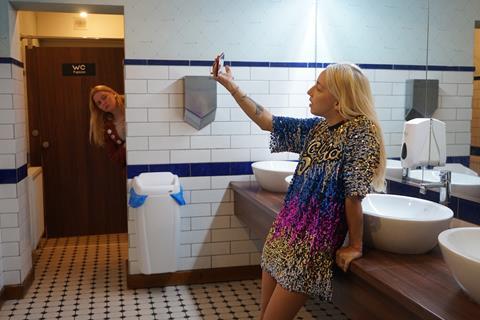Radu Jude’s latest follows a beleagured Bucharest production assistant casting for a safety at work video

Dir/scr: Radu Jude. Romania, Luxembourg, France, Croatia. 2023. 163mins
Described as ’part comedy, part road movie, part montage’ the latest work from Radu Jude feels like several movies rolled into one. Taking its title from a phrase by Polish poet Stanislaw Jerzy Lec, Do Not Expect Too Much From The End Of The World is a typically demanding but playful treatise on the state of the world, the complex connections between past and present and the creation and manipulation of images in a post-truth, deep fake era. An absorbing, thought-provoking reflection on inequality and oppression, it should readily attract further festivals and Jude aficionados after its Locarno premiere.
An absorbing, thought-provoking reflection on inequality and oppression
The heart of the film is a frantic day in the life of hard-working, gum-chewing production assistant Angela Raducanu (Ilinca Manolache). Awakened by an alarm before 6am, she faces another endless day doing everything requested of her by a film production company. Her bosses show little regard for the hours they demand of her or their unreliable record of paying her wages; a central theme is the way in which the powerful constantly exploit the weak.
Angela may be running on fumes but Manolache invests her with a bullish energy and sharp intellect. Her day is mostly spent at the wheel of a people carrier, criss-crossing Bucharest to interview potential candidates to appear in a safety video for an Austrian company. Her radio provides an eclectic soundtrack that ranges from classical to manele – ’turbo folk music’.
Part A of the film is entitled ’ANGELA: A Conversation With A 1981 Film’. Jude uses extensive excerpts from Lucian Bratu’s film Angela Goes On, in which Dorina Lazar starred as a Bucharest taxi driver facing a patriarchal society filled with sexist prejudices. As the modern day Angela travels through the city, Jude interjects scenes from Lazar’s film. The present is shot in a grainy, textured monochrome, while the past is in full colour. The modern world seems coarser and harsher, the traffic more congested, the driving more aggressive and the citizens more stressed.
The attitudes that Angela faced in 1981 are now amplified through the echo chamber of social media, and the modern Angela satirises them in online posts by her alter ego Bobita. Using a gold diffusion filter and adding a goatee and a luxurious monobrow she lets loose with offensive misogynistic rants in which Bobita demeans women, boasts of his sexual conquests and makes references to his good mate, the real-life Andrew Tate.
During the course of the day, Angela collects high-flying Austrian marketing guru Doris Goethe (Nina Hoss) at the airport and picks up lenses from the set of ’Canis Majoris Attacks’, a sci-fi monster movie being directed by Uwe Boll who plays himself as a belligerent, critic-hating artist. The frazzled Angela also meets the four possible candidates to appear in the safety video; all of them are the survivors of real workplace accidents and desperate for the 500 Euro fee. There are conversations around poverty, the cost of living and the dilemma of whether to eat or heat. There is a collective sense of a world beset by corruption and riddled with inequalities.
Angela meets Ovidiu Buca (Ovidiu Pirsan), who is confined to a wheelchair after an accident that left him in a coma for over a year. He lives with (another) Angela and Gyuri, played by Dorina Lazar and Laszlo Miske – the now octogenarian actors from Angela Goes On.
Around the two hour point, we reach part B in which the production company record the testimony of Ovidiu to be used in the safety film. The camera is static, capturing an image of Ovidiu in his wheelchair surrounded by family. In one take, his testimony is challenged, cut and moulded to render it acceptable to the Austrian company who may be liable for his compensation. He is cheerily informed that even the Lumiere brothers needed more than one take to create the reality they were offering to the world. Eventually, in one of Jude’s most telling comic moments, Ovidiu is silenced completely.
Do Not Expect Too Much… unleashes a fizzing catherine wheel of ideas, anger, quotations and references that range from Bob Dylan to King Charles, Salman Rushdie to Elena Ferrante. Restless in spirit and long-winded at points, it is also thought-provoking and funny. Jude makes fine use of Manolache and the ensemble cast, and ultimately succeeds in weaving all his notions and digressions around the central notion that things may change, but exploitation is eternal.
Production companies: 4 Proof Film, Paul Thiltges Distributions, Les Films d’ici, Kinorama, microFILM.
International sales: Heretic ioanna@heretic.gr
Producers: Ada Solomon, Adrian Sitaru
Cinematography: Marius Panduru
Production design: Cristian Niculescu, Andreea Popa
Editing: Catalin Cristutiu
Main cast: Ilinca Manolache, Ovidiu Pirsan, Nina Hoss, Dorina Lazar, Laszlo Miske















![[L-R]: Amanda Villavieja, Laia Casanovas, Yasmina Praderas](https://d1nslcd7m2225b.cloudfront.net/Pictures/274x183/6/4/1/1471641_pxl_20251224_103354743_618426_crop.jpg)








